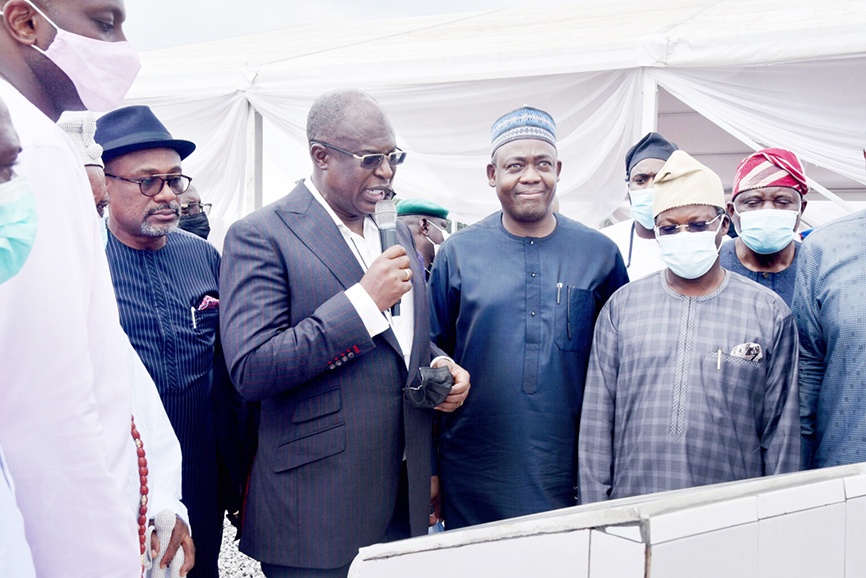Last week’s groundbreaking commissioning of the Rungas Alfa Plant in Lagos by the Minister of State for Petroleum Resources, Chief Timipre Sylva, at Alaro City, Free Zone, Epe, launches Nigeria into unfettered access to becoming the world’s largest manufacturer of composite cylinders, writes our Associate Editor, Eddy Ochigbo.
Rungas Alfa Plant, the celebrated facility alongside its sister plant – Rungas Prime in Polaku, Bayelsa State are being developed with equity investments by the Nigerian Content Development and Monitoring Board (NCDMB) and will on completion have a combined capacity of over 1.2 million cylinders per annum, surpassing the record held by a European firm that produces 900 cylinders.
While describing the cylinder plants as key to achieving deeper penetration of Liquified Petroleum Gas (LPG) and Compressed Natural Gas (CNG), in line with the Federal Government’s commitment to ensure economic diversification using the oil and gas industry as a pivot, the Hon. Minister of State Petroleum Resources, Chief Timipre Sylva disclosed that the cylinders are the most visible element of the LPG value chain and the manufacturing facilities will not only bring affordable and durable cylinders to Nigeria but also create countless direct and indirect jobs for citizens. He commended NCDMB for recording another milestone in the drive to enhance domestic participation and capacity building of indigenous companies in the oil and gas industry.
On his part, the Executive Secretary of NCDMB, Engr. Simbi Kesiye Wabote said the expected completion date of the facility “is 12 months” pledging that the Board would deliver the project successfully.
According to him, “the ground-breaking event confirms that Private-Public Partnership is a pragmatic and workable model for putting in place the needed infrastructure, facilities and manufacturing base to position Nigeria for the opportunities that abound in the region and continent”.

He affirmed the Board’s excitement for being an active participant and a front-runner in taking practical steps to deliver on lofty goals of the ‘’Decade of Gas’’ that is being championed by the Minister of State for Petroleum Resources.
VALUECHAIN learnt that other interventions by the Board in the gas value-chain include development of LPG storage terminals and jetties, inland gas processing for the production of LPG and propane, infrastructure for gas gathering and injection into gas pipeline networks and CNG facilities.
Engr. Wabote said NCDMB was deliberate in going for the Type-3 Composite LPG cylinders considering the unique features such as safety, lightweight, and durability. “Our handshake with the Rungas Group will catalyse the transition away from the heavy metallic LPG cylinders. It will also address the issue of high importation of LPG cylinders with the attendant economic losses,” he added.
Other benefits of the project include helping to eliminate deaths and illnesses caused by smoke and wood fumes associated with cooking with firewood and bringing the products closer to end-users.
Shedding light on the rationale behind the Board’s equity investments in strategic oil and gas projects, Wabote noted that the Nigerian Oil and Gas Industry Content Development (NOGICD) Act mandates the Board to build capacities in the oil and gas industry and harness opportunities to create jobs.
He insisted that “you cannot create jobs if you do not get involved in projects. We expect that during the construction phase, hundreds of people will be involved and during the operations phase, direct and indirect jobs will be created. There is no way to create jobs if you do not create the opportunity.
“As a country we cannot continue to sit and wait for people to bring the opportunities for us. We must create those opportunities so we can employ our youths.
We have proven the concept with regards to modular refinery and today the Waltersmith modular refinery cannot even meet demand from customers for its products. Imagine that we had done this in the past; today we would not be discussing the issue of fuel availability or scarcity in this country.”
He advised stakeholders to read the NOGICD Act which established NCDMB. “It clearly mandates the Board to get involved in things like this and ensure the catalysation of manufacturing facilities,” he concluded.
Section 70 (h) of the NOGIC Act states that functions of the Board shall be to “assist local contractors and Nigerian companies to develop their capabilities and capacities to further the attainment of the goal of developing Nigerian content in the Nigerian oil and gas industry.”
Also speaking, the Chief Executive Officer, Rungas Group, Mr. Lanre Runsewe lauded the NCDMB for triggering the local manufacturing of safe cooking gas cylinders and becoming the catalyst for the rapid industrialisation of gas-based Industries.
He stated that “without the NCDMB initial and extended facilitation for the local manufacture of cooking gas cylinders in Nigeria, it would have been more difficult and expensive to implement the imminent National Gas Expansion Programme (NGEP) roll out, due to lack of locally manufactured safe cylinders. The country would have had to resort to importation.”
He also revealed that NCDMB’s participation and the substantial quantity of cylinders to be manufactured had “triggered a clause in our contractual agreements based on one million cylinders with our Italian, Portuguese Original Equipment Manufacturers which will result in direct investments of over USD$40m to produce some of our key raw materials in Nigeria. We are currently working in conjunction with our Alaro City Partners to position them in this Free Trade Zone.”
Chairman, Rungas Group, Ambassador Shuaibu Ahmed said the facility in Bayelsa was Africa’s first composite cylinder manufacturing plant and expressed hope that the facilities would produce enough products to meet local demand and export to other countries, earning the nation much needed foreign exchange.


